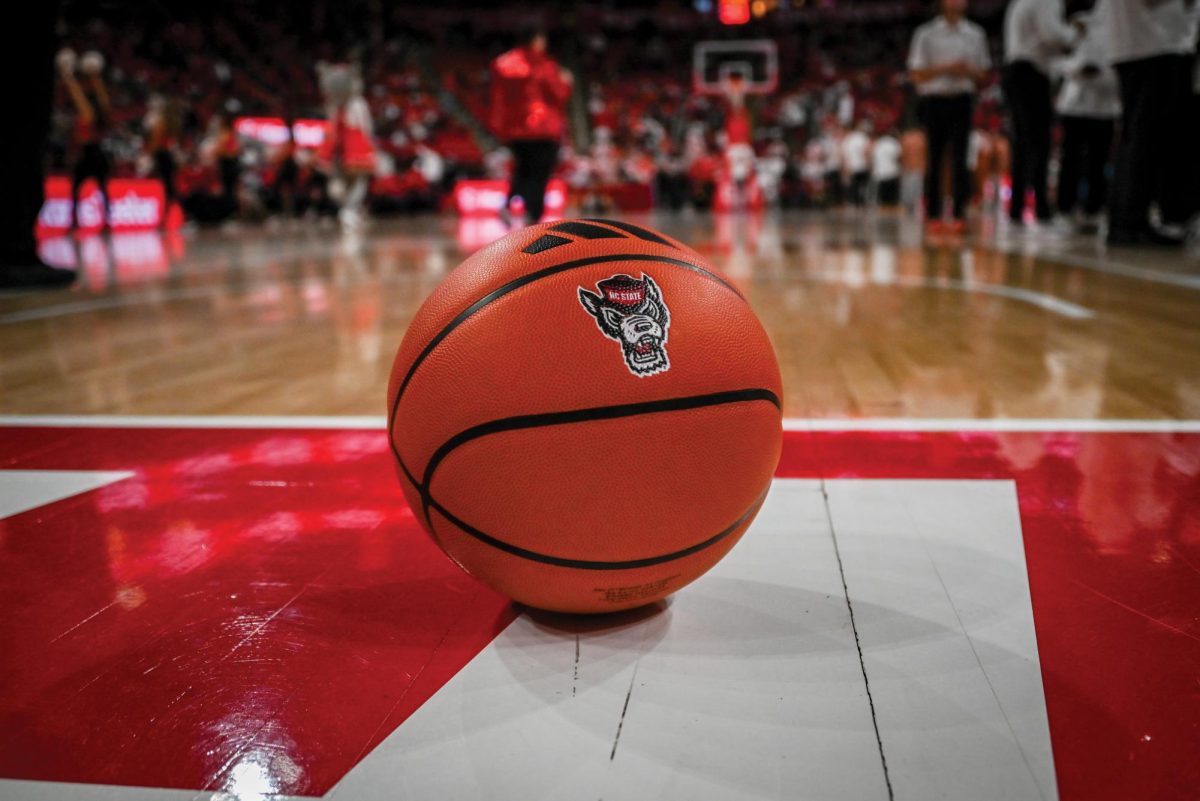
Griffin Bryant
A basketball is left on the endline in a timeout during the Wolfpack’s home game against the Texas Longhorns in the Lenovo Center on Wednesday, Dec. 4, 2024. The Longhorns beat the Wolfpack 63-59.
Basketball is built on emotions. Every shot, pass and block carries energy — for players, people in the stands and everyone at home.
Imagine a player lands the game-winning shot, and the crowd roars in excitement. For the player, all of this energy doesn’t disappear the moment the ball goes through the net. Yet, in many cases, the expression of that emotion is being penalized.
Rules against “unsportsmanlike conduct” often punish players for what amounts to expressions of passion and competitiveness.
To me, this approach undercuts one of the most authentic parts of the sport. Celebration is not a lack of discipline; it’s a natural response to competition. When players are penalized for expressing emotion, the game risks becoming more mechanical and less human.
When I asked a few students playing basketball on campus how they felt about these penalties, I found a spectrum of opinions — but a shared sense that celebration, in moderation, has a place in the game.
“I don’t mind it,” said AJ Caterino, a second year studying business administration. “It adds more fun elements to the game to celebrate with your friends and stuff. I think if you do it too much, it can slow down the game and be annoying, but a calm celebration is pretty good.”
Caterino’s point captures a reasonable middle ground. Sportsmanship should not mean stripping emotion out of the sport entirely. There’s a difference between joy and showboating — but the line isn’t always as thin as the rulebook implies.
Max Blackmon, a second year studying business administration, said the penalties are “too strict,” adding that players should be able to “let loose and have fun.” He also argued that opponents who take issue with celebration might be focusing on the wrong thing.
“If you’re getting mad at that as the opponent, you should probably just stay focused on your own game,” Blackmon said.
That perspective reflects something deeper about competition. Sports are about skill, effort and mindset — and part of that mindset is confidence. Celebrations can be an extension of that, a way for players to express control and momentum without crossing into disrespect.
Kenny Olmedo, a first year studying biological sciences, offered another insight, suggesting that suppressing emotion can be counterproductive.
“It’s an emotional game,” Olmedo said. “If you’re not allowed to celebrate, you build up that emotion in you, and maybe that comes out in a more negative way later.”
In other words, emotion will find an outlet one way or another. Allowing players to celebrate in healthy, limited ways can actually prevent frustration from boiling over later in the game.
Taken together, these perspectives point toward a simple truth: celebration and sportsmanship are not mutually exclusive. A well-timed fist pump or yell after a big play isn’t about disrespect, it’s about presence. It’s about players recognizing the intensity of the moment they’re part of.
The intent behind unsportsmanlike conduct rules is understandable. Nobody wants the game to devolve into taunting or personal attacks. But when enforcement becomes rigid, it undermines what makes sports compelling in the first place.
Those moments aren’t displays of arrogance — they’re a part of the competitive rhythm of the sport. Even light taunting, while not ideal, often reflects the intensity that makes high-level basketball so engaging.
Basketball is not just about points and possessions; it’s about emotion, rhythm and connection. Players should be free to express that, within reason, without fear of punishment.
Emotion doesn’t ruin the game — it’s what makes it worth watching.